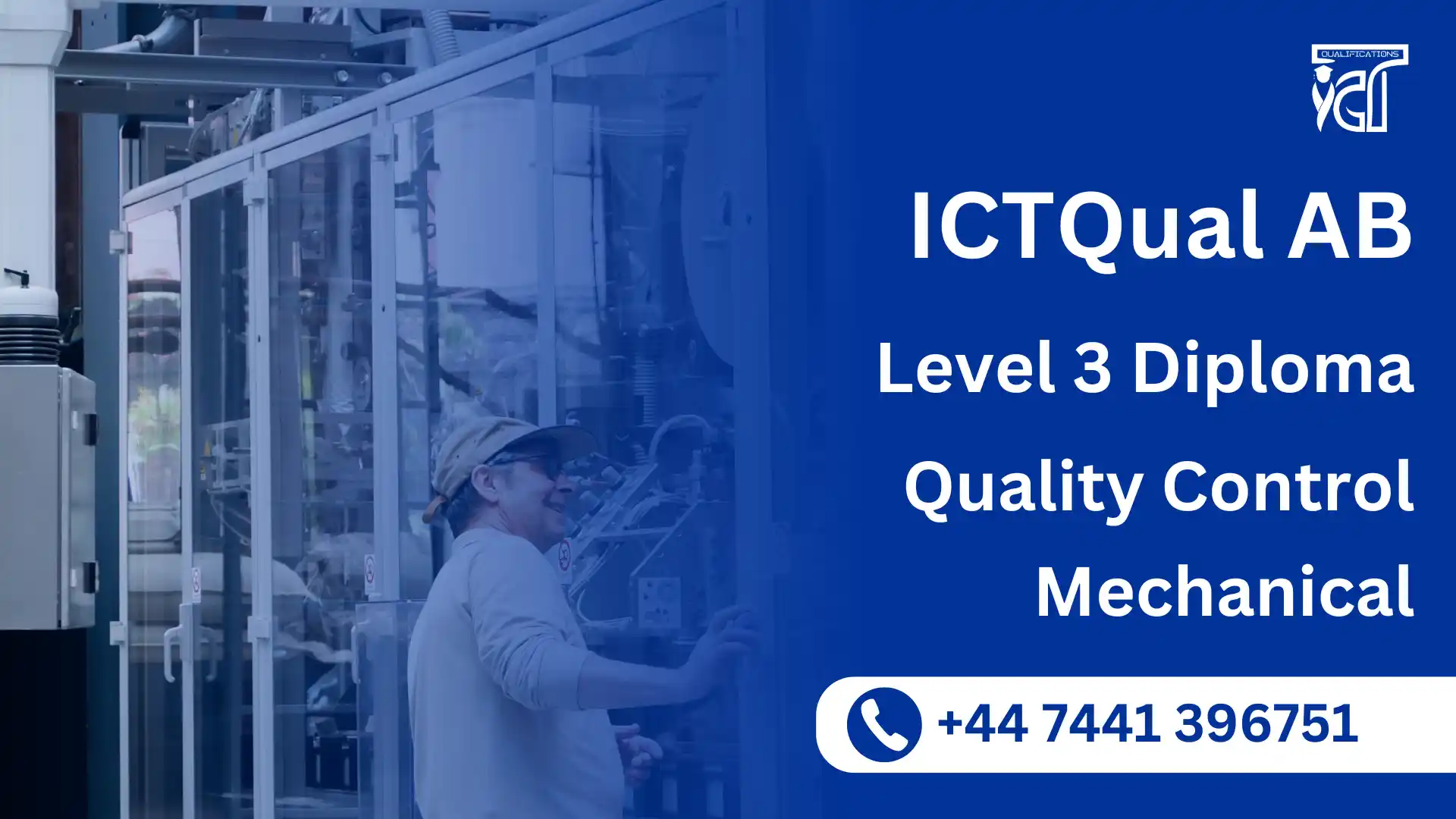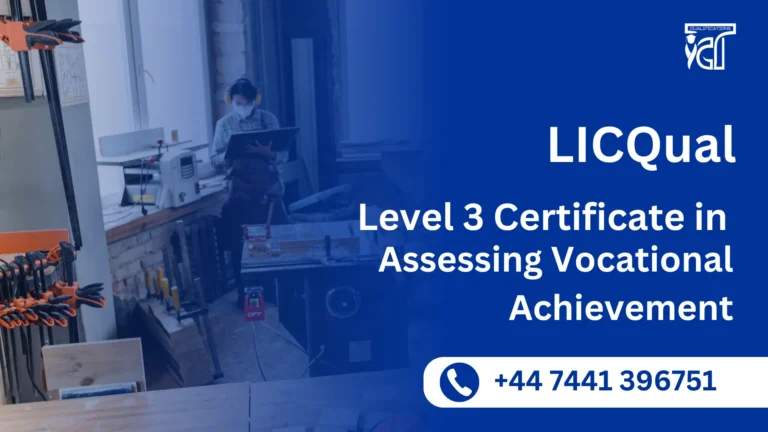The ICTQual AB Level 3 Diploma in Quality Control Mechanical is a comprehensive qualification designed to prepare learners for technical roles in mechanical quality assurance and inspection. This diploma focuses on developing a strong foundation in the principles, techniques, and practices used to ensure the quality and reliability of mechanical systems, components, and processes.
Through a blend of theoretical knowledge and practical application, learners will gain expertise in mechanical measurements, defect detection, materials testing, inspection procedures, and quality documentation. The course also introduces quality standards, control charts, tolerance analysis, and basic quality management systems relevant to mechanical environments.
Ideal for aspiring quality inspectors, technicians, and production support staff, this diploma equips learners with the skills needed to perform quality control tasks across a range of sectors including manufacturing, engineering, automotive, construction, and industrial operations. It also serves as a pathway to higher-level qualifications in quality control or mechanical engineering.
ICTQual AB Level 3 Diploma in Quality Control Mechanical
This qualification, the ICTQual AB Level 3 Diploma in Quality Control Mechanical, consists of 6 mandatory units.
• Principles of Mechanical Quality Assurance
• Use of Gauges, Calipers, Micrometers, and Non-Destructive Testing (NDT) Methods
• Material Properties and Defect Identification in Mechanical Components
• Inspection Procedures for Fabrication, Welding, and Machining
• Documentation and Reporting in Mechanical Quality Control
• Workplace Health and Safety in Mechanical Quality Environments
Here are the learning outcomes for each study unit:
Principles of Mechanical Quality Assurance
- Understand the fundamental principles of quality assurance in mechanical engineering.
- Learn the differences between quality control and quality assurance processes.
- Apply industry-standard methodologies to monitor and maintain product quality.
- Identify quality benchmarks and their importance in mechanical production.
Use of Gauges, Calipers, Micrometers, and Non-Destructive Testing (NDT) Methods
- Gain practical skills in using mechanical measurement tools such as calipers and micrometers.
- Understand the selection and calibration of precision gauges.
- Learn the fundamentals of Non-Destructive Testing (NDT) techniques.
- Apply NDT methods to evaluate component integrity without damaging the material.
Material Properties and Defect Identification in Mechanical Components
- Understand key mechanical properties such as tensile strength, hardness, and ductility.
- Identify common material defects and their causes in mechanical parts.
- Evaluate materials for suitability in specific applications based on their properties.
- Apply inspection techniques to detect early signs of failure or degradation.
Inspection Procedures for Fabrication, Welding, and Machining
- Learn standard inspection procedures for mechanical fabrication and welding operations.
- Understand how to inspect machined components for dimensional accuracy and finish.
- Develop the ability to interpret welding symbols and inspection drawings.
- Identify common defects in fabrication and machining, including cracks, warping, and misalignment.
Documentation and Reporting in Mechanical Quality Control
- Understand the importance of accurate documentation in quality control operations.
- Learn how to prepare and complete inspection reports and quality records.
- Develop skills in data collection, analysis, and trend monitoring.
- Apply best practices for communicating inspection findings clearly and professionally.
Workplace Health and Safety in Mechanical Quality Environments
- Recognise potential hazards in mechanical inspection and quality control settings.
- Apply health and safety regulations relevant to mechanical environments.
- Use personal protective equipment (PPE) correctly during quality inspections.
- Promote a safety-first culture while maintaining inspection accuracy and efficiency.
Benefits of the ICTQual AB Level 3 Diploma in Quality Control Mechanical
Comprehensive Skill Development
Learn essential mechanical quality control practices including inspection techniques, material testing, and defect analysis to meet industry standards.
Enhanced Employability
Gain a recognized qualification that increases your job prospects in manufacturing, engineering, automotive, construction, and industrial sectors.
Practical and Industry-Relevant Training
Apply real-world quality control methods used in mechanical workshops and production environments, ensuring you’re job-ready.
Strong Foundation for Career Growth
Build the skills and knowledge required to progress into supervisory or specialized roles in quality assurance or mechanical inspection.
Focus on Accuracy and Compliance
Understand how to assess product quality, ensure dimensional accuracy, and comply with technical specifications and safety regulations.
Boost Workplace Efficiency
Learn how to identify quality issues early, reduce rework, and contribute to more efficient and reliable production processes.
Pathway to Advanced Qualifications
Use this diploma as a stepping stone to higher-level courses such as Level 4 or Level 5 Diplomas in Mechanical Engineering or Quality Management.
Increased Confidence and Professional Credibility
Demonstrate your competence and commitment to quality standards, making you a more valuable asset to employers and clients.
Who is the ICTQual AB Level 3 Diploma in Quality Control Mechanical Best Suited For?
This course is ideally suited for:
- Entry-Level Quality Control Aspirants
Individuals seeking to begin a career in mechanical quality control, inspection, or manufacturing support roles. - Technical and Vocational Graduates
Students who have completed basic education or vocational training in mechanical engineering or related fields and want to gain specialized quality control skills. - Production and Workshop Assistants
Personnel currently working in mechanical or industrial settings who aim to develop formal knowledge and certification in quality assurance practices. - Career Starters and School Leavers
Recent school graduates who want an industry-relevant qualification to improve their employability in technical fields. - Career Changers from Related Trades
Individuals with a background in mechanical work, maintenance, or machine operation looking to transition into quality assurance roles. - Aspiring Quality Inspectors and Technicians
Those planning to pursue a long-term career in quality control or mechanical engineering and seeking a solid educational foundation to build upon.
Entry Requirements
Register Now
Qualification Process
Qualification Process for the ICTQual AB Level 3 Diploma in Quality Control Mechanical
- Self-Assessment:
Begin by evaluating your eligibility to ensure you meet the qualification requirements, including work experience, knowledge, and language proficiency. - Registration:
Complete your registration by submitting the required documents, including a scanned copy of a valid ID, and paying the registration fee. - Induction:
An assessor will conduct an induction to confirm your eligibility for the course and explain the evidence requirements. If you do not meet the criteria, your registration will be cancelled, and the fee will be refunded. - Assignments & Evidence Submission:
Provide all assignments and the necessary evidence based on the assessment criteria outlined in the course. If you are unsure of the required evidence, consult with the assessor for guidance on the type and nature of evidence needed. - Feedback and Revision:
The assessor will review your submitted evidence and provide feedback. Evidence that meets the criteria will be marked as “Criteria Met,” while any gaps will be identified. You will be asked to revise and resubmit if needed. - Competence Evidence:
Submit final evidence demonstrating that all learning outcomes have been met. This evidence will be marked as “Criteria Met” by the assessor once it is satisfactory. - Internal Quality Assurance (IQA):
The Internal Quality Assurance Verifier (IQA) will review your evidence to ensure consistency, quality, and compliance with standards. - External Verification:
The IQA will submit your portfolio to ICTQUAL AB External Quality Assurance Verifiers (EQA) for final confirmation. The EQA may contact you directly to verify the authenticity of your evidence. - Certification:
Upon successful completion of all checks, ICTQUAL AB will issue your official certificate, confirming that you have attained the ICTQual AB Level 3 Diploma in Quality Control Mechanical.






